- Depi nan Ginen bon Nèg ap ede Nèg!
- jafrikayiti@gmail.com
Haiti an International Crime Scene

Ze a!
December 3, 2021
Confessions of Haitian Kidnapper Arnel Joseph
December 21, 2021Haiti an International Crime Scene

The following slides provide a quick overview of Haitian history. This presentation was offered during a webinar hosted on December 19, 2021 by the Democratic Socialists of America, San Francisco, where I was blessed and honoured to share the discussion panel with Dr. Jemima Pierre and Dr. Mamyrah Dougé-Prosper, two powerful voices of the African world, two daughters of Haiti whose scholarly work and activism bring much needed light in our world.
I encourage the reader to consult the hyperlinks and references, where provided, for more in depth reading. Do not hesitate to download and share these for educational purpose, indicating the original source and authorship, dutifully.
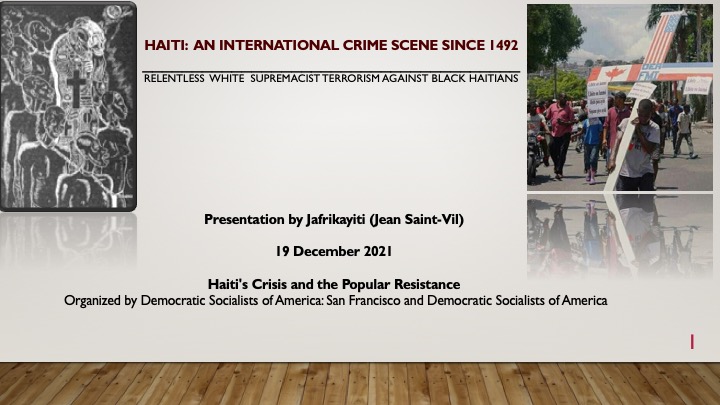
Many citizens of the US, Canada and Europe express discomfort when presented hard evidence that white supremacist ideology inspired the founders of their nations. However, most might still refuse to acknowledge that such deadly and racist ideology continues to plague the foreign policy that is funded by their hard-earned tax dollars, in modern times.

Haitians are “black bodies” on the move. The black body is still considered and treated as a threat in the Americas and across many oceans. The following slides will help substantiate this disturbing affirmation.
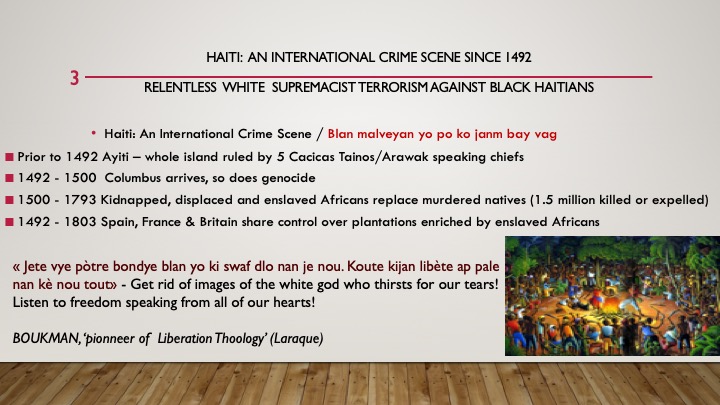
Two world views has been waging war on the small Caribbean Island, since 1492. European greed, avarice and barbarism in support of “profit above all else” stand opposed and vexed by stubborn ideals of brotherhood and universal freedom espoused by the original Arawaks People who once welcomed the Spaniards, then the French and the British on the island.
Kidnapped, displaced and enslaved Africans who would eventually replace the Arawaks, liberated the island from all European slavers and proclaimed: “Tout moun se moun” (all humans beings are human – thus, meant to be free).
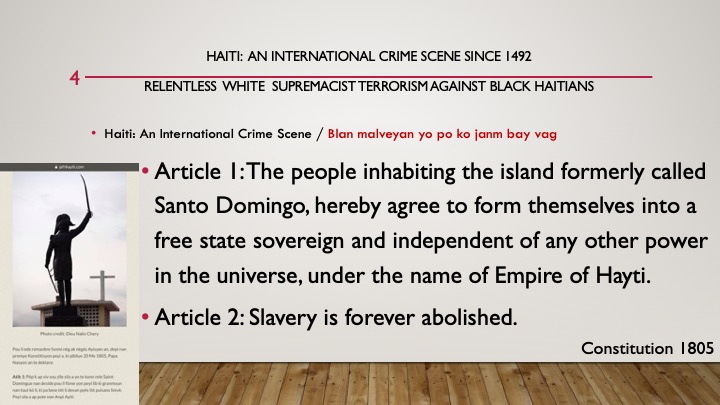
European greed will not give up. Before its liberation, Haiti, as a colony fueled by racial slavery, brought more profit to the French treasury than all 13 British colonies combined brought to the British Monarchs.
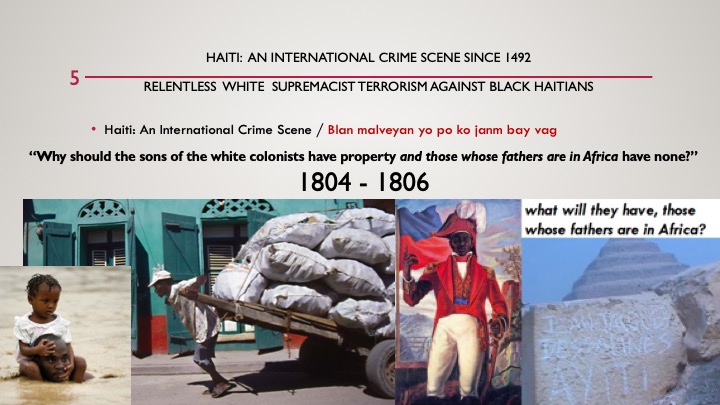
The success of the Haitian Revolution only lasted 2 years (1804-1806). Founder Jean-Jacques Dessalines who was adamant about the necessity to establish the abolitionist Empire of Hayti on the highest principles of justice and genuine brotherhood, was assassinated on October 17, 1806.
Mixed-race leaders Alexandre Pétion (#1 suspect), Jean-Pierre Boyer, Borgella and others rejected Dessalines’ ideals and were favourable instead to that espoused by Francisco Miranda and Simon Bolivar in the the rest of Latin America, whereby the white supremacist racial hierarchy was, by all means, maintained following proclamation of independent republics.
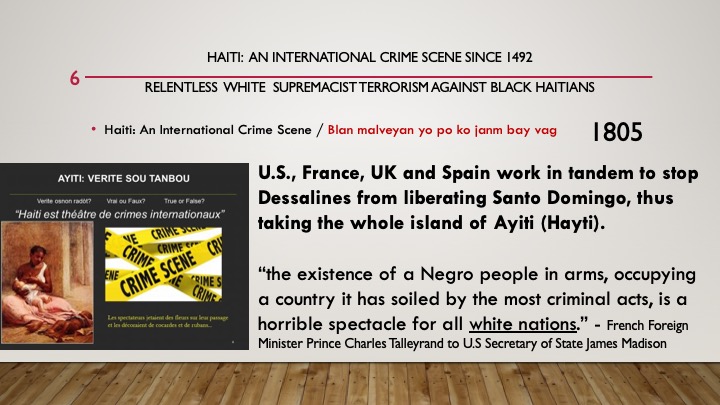
Traitors received much help from their former European and Euro-American masters, as they conspired to assassinate Dessalines and, effectively, undo the Haitian Revolution.
Considering the demographics, the outnumbered “mulatto” cast and their “several generations-freed black” allies paid lip service to core ideal of “abolition of slavery”. Also, from time to time, to calm racial tensions, they accepted to place a black-face puppet “president” in the palace of their otherwise anti-Black so-called “First Black Republic”.

King Henri Christophe refused to play along. He separated from the fake Black Republic and established a progressive truly abolitionist Kingdom, in the North of Hayti. He is one of the rare Haitian leaders whose views survived in written form through the Gazette Royale du Cap (be sure to check out amazing scholarly work of Professor Marlène Daut, University of Virginia).
Of course, if you rely of what the “mulatto” writers of early Haitian history printed about this man, your opinion might be very different from that of 145 Africans freed by this navy in the waters of Northern Hayti in 1817. Tragically, Christophe, builder of the famous Citadel Henry, committed suicide in October 1820.
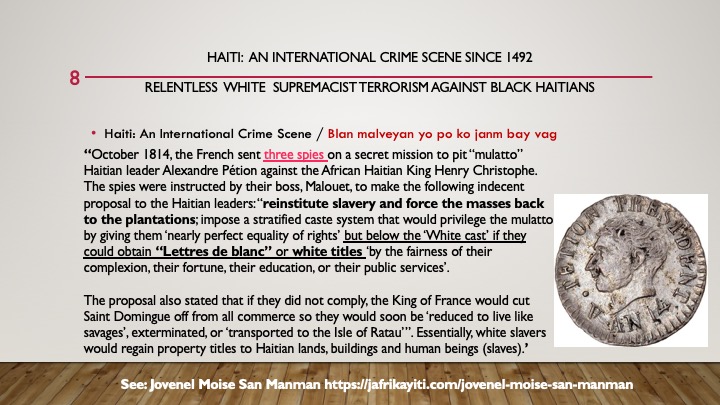
Slide #8 is key to understand why Haiti is currently functioning as an “anti-Black, Black Republic”.
Although the indecent proposal made by the French spies sent to Hayti by Malouet in 1814 was officially rejected, even by Pétion, there is much evidence that a more subtle recolonization plan was secretly negotiated between Pétion and the French monarchy. King Henri Christophe had, for several years, denounced Pétion’s treason on the pages of Gazette Royale. Please consult my article: https://jafrikayiti.com/jovenel-moise-san-manman/
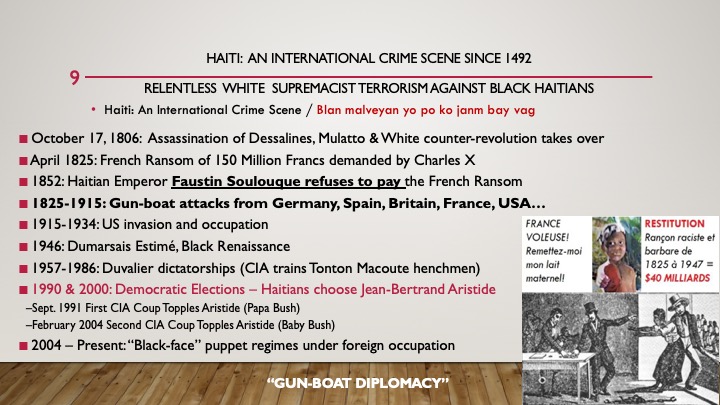
The attacks of “white nations” against Haiti, never stopped! The 1825 ransom was only one of several such episodes of “gun-boat diplomacy” that European military powers used to deprive the young black Caribbean nation of its breastmilk. Haiti never had an opportunity to build its physical infrastructure. The 1825 ransom collected up to 1947 represents more than USD $40 Billion US, even if calculated at minimal interest rates.

Every time Haiti had a decent leader, he was systematically targeted for destruction by a coalition of white attackers. Please see https://jafrikayiti.com/time-to-stop-resisting-haitis-resistance/

Naturally, when the US officially invaded Haiti, the Yankees claimed it was to “help put order in our black brother’s disorderly house”. You should consult the National Geographic of those years, if your stomach can handle it.

As they did to reverse the liberation process in 1960’s Congo, murdering Prime Minister Patrice Lumumba in the process, allied white supremacist powers mobilized United Nations troops in 2004 to consolidate a racist coup – kidnapping against Haiti’s legitimate government (i.e.: President Jean-Bertrand Aristide and 7000 duly-elected officials). U.S. President George Bush, the lesser, was visibly much pleased by the whole thing. “Haitian democracy is working” he said for the cameras assembled on the White House grass, while Haitians were being slaughtered by the coup forces, including the foreign invaders
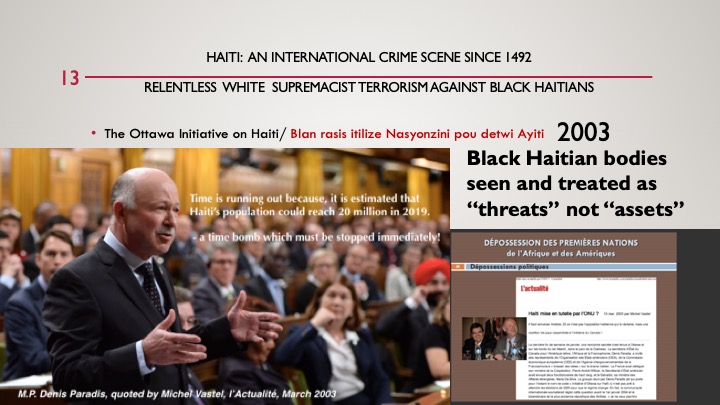
An obsessive fear of “black threats” justified the racist bicentennial coup, according to leaked reports. Please read https://jafrikayiti.com/what-is-canada-doing-in-haiti/

Luigi Einaudi said “The real problem with Haiti is that the International Community (code word for white powers) is so screwed up and divided, they are letting Haitians run Haiti“. I was right in front of him when he said it, with several other witnesses. Please see https://jafrikayiti.com/five-truths-about-haiti/

The neo-colonial system is a replica of the colonial one. In 1791, there were 20 thousand white slaving colonists on the island who relied on the military might of France, Britain, Spain and the US to maintain 450, 000 Africans in bondage. They also counted on the fragile collaboration of 20 Affranchis (Free Blacks and mixed-race individuals).
Today, 15 while families rule Haiti behind blackface puppet “presidents”. Of course, these illegal weapons and drug trafficking barons count on the military might of the United States and its imperialist allies to contain the island’s “black threat”.
Most media publications portending to discuss the crisis in Haiti stay clear of this touchy subject. Instead, as instructed, they keep things rather simple with clichés such as: “poorest country in the hemisphere”, “troubled history”, “corrupt leaders”, “earthquake” and, when in a bind….”bad luck and rumours of an old curse” – simple stuff!

Not only have Haitians never elected fools like CIA stooges François and Jean-Claude Duvalier or Michel Martelly, the objective facts demonstrate that, time and again, Haitians chose excellent leaders to help their nation progress. And, systematically, these leaders have been attacked, sabotaged, kidnapped – one of them (Cincinnatus Leconte) blown to pieces while inside the national palace. This particular assassination carried for and by the klan of Middle-Eastern immigrants, that the US gradually helped take over the strategic Haitian import-export space. The assassination conducted on Jovenel Moise, July 7, 2021, bears the same dirty fingerprints in Miami, Florida and the mountains of Petion-Ville. (Google: Samir Handal, Rodolphe Jaar, DEA in Haiti).
“Every time I plant a seed, you say kill it before it grows” – I shot the sheriff, Robert Nesta Marley.

212 years ago, 14 January 1804: Haiti’s First Leader, Jean-Jaques Dessalines, responded to crisis in the U.S.
Barely days after the creation of the Republic of Haiti, Jean-Jacques Dessalines published a decree in which he announced his intention to devote part of the nation’s meager post-war budget to securing the emancipation of formerly enslaved human beings. Many American slave ship captains collected the 40 dollars payment Dessalines had reserved for the release of each formerly enslaved person who sets foot on Haitian soil. “Brother Dessalines, I was enslaved, and you bought me freedom”.
12 January 2010: The First Black President of the U.S.A responded to Crisis in Haiti. Do you remember the specifics? “Brother Obama, I was thirsty, buried under rubbles, why did you send me scary soldiers?”
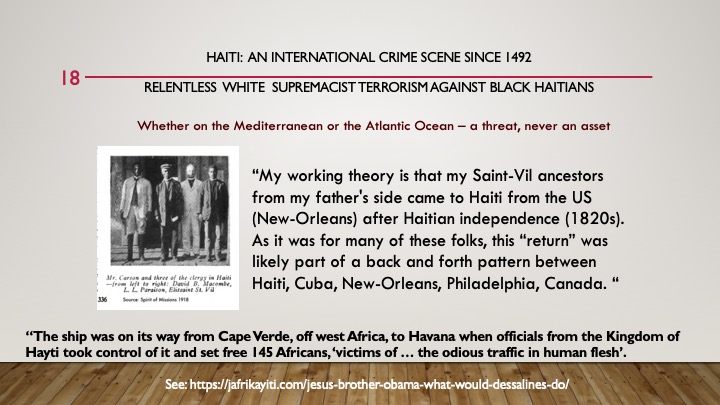
Back in the 1800s, while so-called “white liberals” in the Americas and Europe were paying lip service to the cause of human brotherhood and universal freedom, with “la société des amis des Noirs” agitating for an extra day of rest for the millions of enslaved Africans, there stood in the United States of North-America, a beautiful human soul named John Brown who, contrarily to the self-styled “liberals”, had refused to advocate for “slavery light”. Rather, Brown took up arms, joined his African brothers and demanded that racial slavery – the absolute evil – be immediately and forever eradicated from the face of earth.

During three days of national mourning for John Brown’s execution, flags in Port-au-Prince were flown at half mast. A solemn mass was held in the cathedral, with the active participation of President Fabre Nicholas Geffard. It is also then that the main boulevard of Port-au-Prince was named Avenue John Brown.
All over the island, collections were made and subscriptions started in behalf of the widow of John Brown. They collected twenty thousand dollars ($20,000) for Brown’s family.
“Lè ou wè vye zo sou chimen, sonje yon jou li te pote chè sou li”
When you see old bone by the road, be mindful that it had once carried flesh and muscles – Haitian wisdom

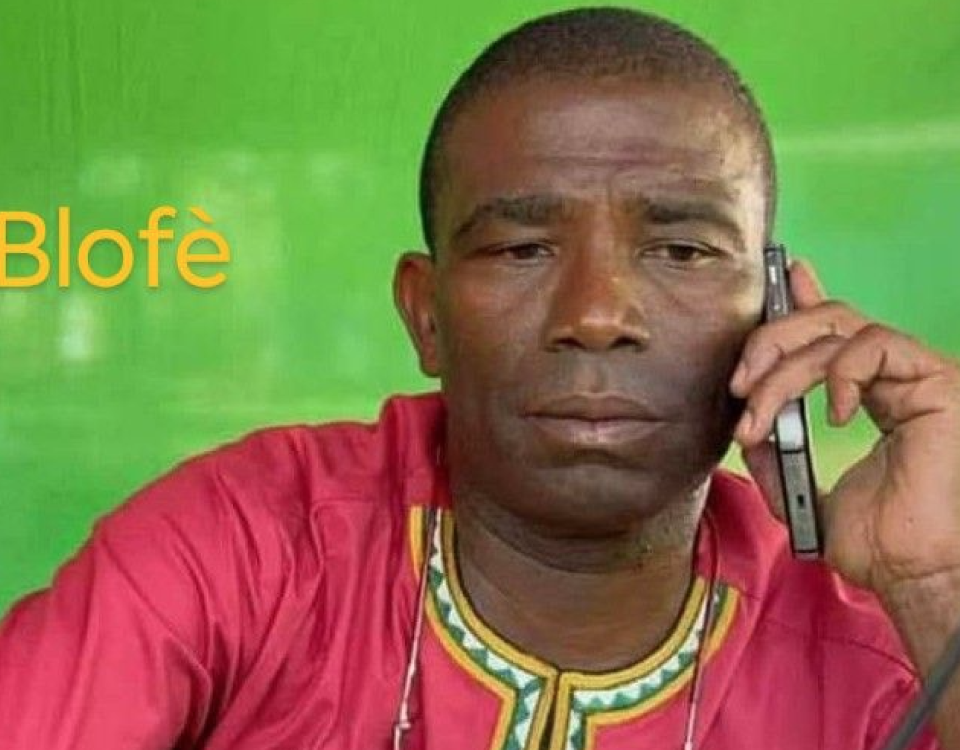
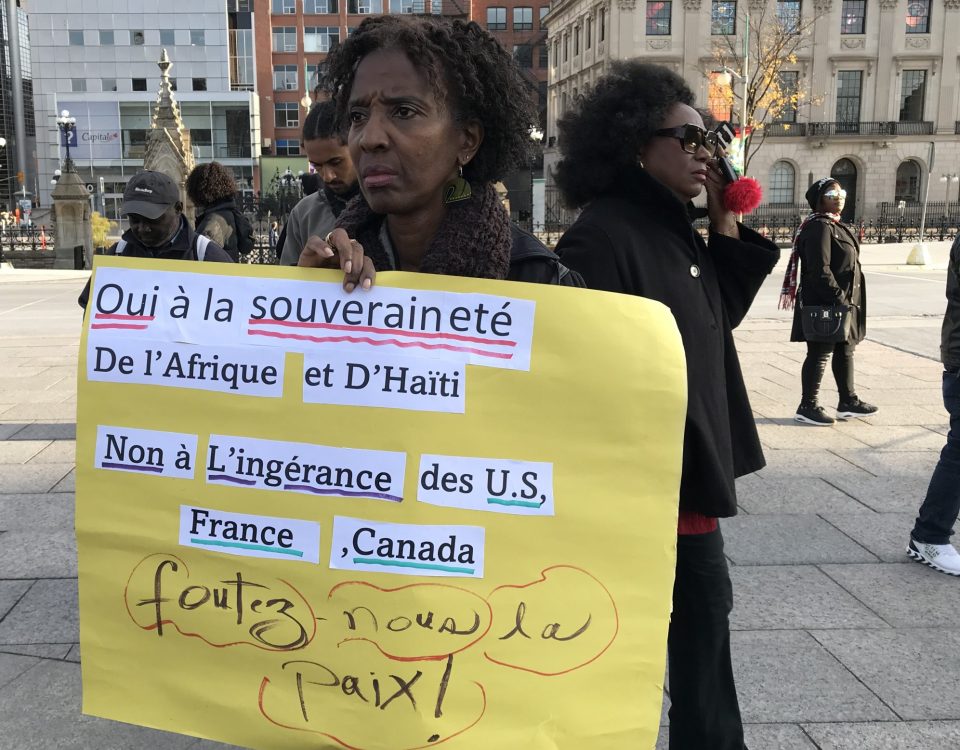
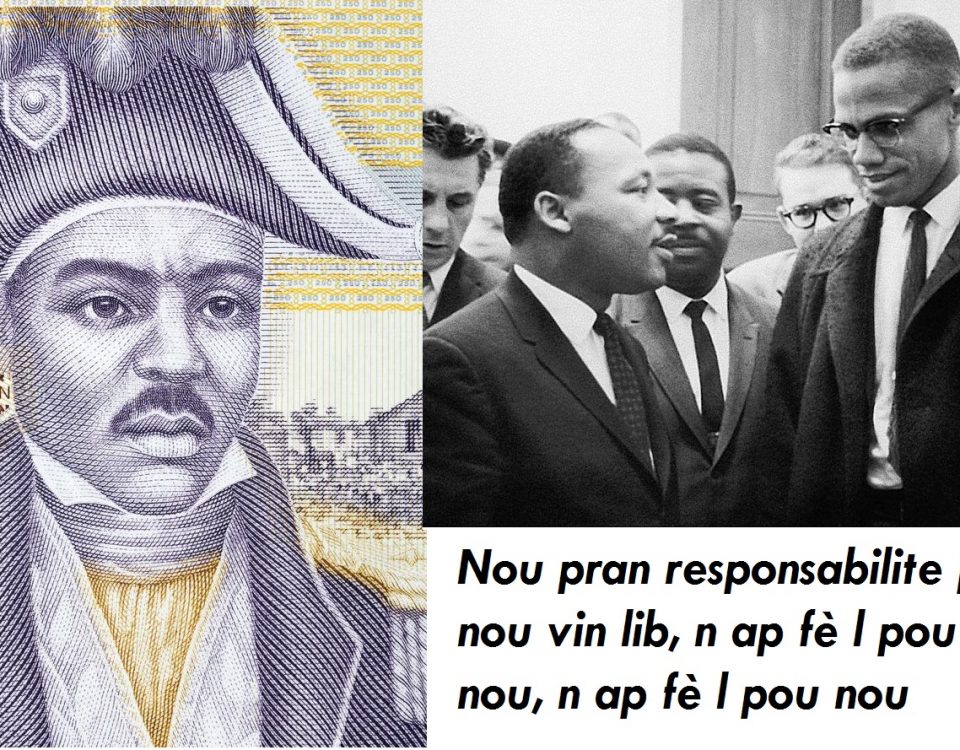
1 Comment
Jah & Jahes love. I agree with you that Ayiti is an international crime scene and has been since KKKristopher kkkolumbus landed there on December 5, 1492! I am proud of the fact that Emperor Dessalines paid boat captains to bring blacks who were enslaved in other countries to Ayiti to be free! Still, I kinda understand sister Kamala Harris’ decision to deport the Haitian refugees. In the U.S. they would have to remain in jail or immigrant prison for an undetermined period of time until the Court decides to either release them into the U.S. or to deport them. And, for me, that’s not acceptable. The state of incarceration is really bad and Haitian people in ICE custody have suffered a great deal. There have been a lot of lawsuits brought by women who were raped and violated by prison guards and so forth.
I also don’t think that this is a good time for Haitian refugees to enter the U.S. I am one of the millions of Ayiti descended people in the U.S. I was born in New York City and I have a B.A., M.A. and I’m ABD. But, I am homeless, my children were taken from me and I have not seen them in 11 years!
Marlene Bastien who became well known for her work with Haitian refugees in Miami said recently, that in the 1980s, they would release Haitian refugees and asylum seekers to the streets of Miami where they languished.
I feel that the Vice President, Kamala Harris should focus on doing her job as our main caretaker of Domestic Affairs. We have a huge problem of homelessness and unemployment. The Covid19 pandemic has exacerbated these problems and the U.S. government has not presented a plan to resolve them! Unfortunately, and as usual, black folks, most specifically, the descendants of the enslaved Africans and especially the Haitians are most affected by these problems! The areas in NYC that are most devastated by Covid 19 are in Queens, Bronx, and Brooklyn where large numbers of Haitians live. The problem was made worse because of previously existing conditions caused by low wealth. These were immigrants without access to good health care, good-paying jobs with benefits, good housing (in fact most live in overcrowded housing that is in poor conditions).
So, while I agree that the U.S. especially black folks should demonstrate some respect for the past good that was done to save blacks who ran to Ayiti to escape slavery, I don’t feel that we are in a position to offer a better home for Haitian refugees at this time. They are better off at home in their country! Blessed love. #Ayiti #1804 #FreeAyiti